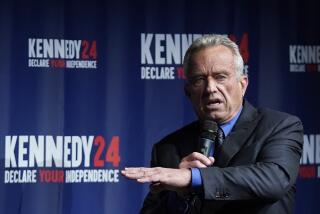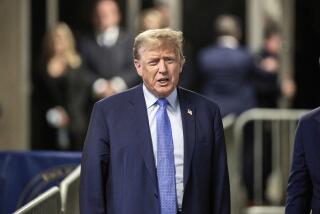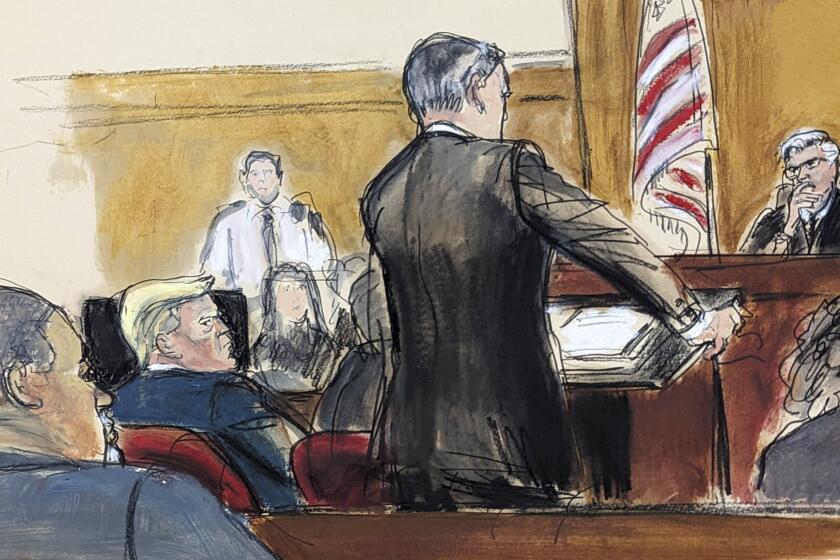Much talk, little action on ‘fiscal cliff’ as Congress returns
WASHINGTON — Congress returned to a lame-duck session with no signs of quick compromise to ease the nation’s budget deadlock, and the White House rolled out a strategy Monday to marshal popular support for raising taxes on the wealthiest tier of income earners.
Closed-door talks by senior aides produced no clear progress despite President Obama’s private phone call over the weekend to House Speaker John A. Boehner (R-Ohio) in an effort to forge a deficit reduction deal in the five weeks before current tax rates expire, which would lead to tax increases for most Americans.
Familiar lines began to form as both sides jockeyed to avoid the so-called fiscal cliff, the combination of $500 billion in automatic federal tax increases and spending cuts that economists warn could send the nation back into recession next year.
Quiz: How much do you know about the ‘fiscal cliff’?
But the battle assumed new contours as some senior Republican lawmakers distanced themselves from their party’s strict anti-tax pledge and Obama took his case public. He warned that the threat of a tax hike on ordinary Americans could dampen winter holiday spending and create a crisis in consumer confidence.
“The president has called on Congress to take action and stop holding the middle class and our economy hostage over a disagreement on tax cuts for households with incomes over $250,000 per year,” the White House said in a statement.
Obama got a boost from billionaire investor Warren Buffett, who said wealthier Americans, including himself, should pay more taxes. He dismissed Republican arguments that such tax increases would hamper investment.
“In recent years, my gang has been leaving the middle class in the dust,” Buffett wrote in an op-ed for the New York Times. “Let’s forget about the rich and ultrarich going on strike and stuffing their ample funds under their mattresses if — gasp — capital gains rates and ordinary income rates are increased.”
The broad outline of a deal could be seen, although any accord appeared far from imminent.
Over the last week, three top Republican lawmakers — Sen. Lindsey Graham of South Carolina, Sen. Saxby Chambliss of Georgia and Rep. Peter T. King of New York — all indicated they were willing to raise some taxes in exchange for an agreement from Democrats to curb spending. They broke publicly with conservative stalwart Grover Norquist, the influential president of Americans for Tax Reform.
“It’s fair to ask my party to put revenue on the table,” Graham said on ABC’s “This Week.” “I will violate the pledge, long story short, for the good of the country — only if Democrats will do entitlement reforms.”
A framework for a compromise had emerged after the Nov. 6 election. Boehner proposed a two-step process that would put a down payment on deficit reduction this year and set targets for undertaking a comprehensive overhaul of taxes and entitlement spending in 2013.
In the days since, however, talks have become “slow,” according to one congressional aide. Republicans insist that new revenue must come from economic growth, which they believe would be produced by revamping the tax code to lower all tax brackets — an approach Democrats reject as “fairy tale” economics.
Democrats are unwilling to discuss cuts to Medicare, Medicaid or other government programs unless Republicans put upfront revenue on the table, aides said.
Frustrations over the standoff have grown, and one lawmaker, Sen. Bob Corker (R-Tenn.), proposed his own solution Monday — capping itemized deductions at $50,000 in exchange for changes to Medicare and cuts to other government programs.
Such an approach is in line with proposals being discussed, though Obama has promised the tax increases would hit incomes only above $250,000 for couples or $200,000 for singles.
No talks among the principal players are scheduled this week, even though both sides say they want to avoid brinkmanship as they push toward a Christmas deadline. All tax rates expire on Dec. 31, which would result in automatic tax increases; spending cuts are set for Jan. 2.
Aides to the president acknowledged they didn’t hold high hopes after Obama spoke to Boehner over the weekend. But they didn’t go so far as to echo Senate Republican leader Mitch McConnell of Kentucky, who used the word “impasse” Monday in discussing the long pursuit of a grand budget deal.
“We remain confident we can achieve an agreement,” White House Press Secretary Jay Carney said. “We remain hopeful and optimistic we can reach a deal.”
Staff negotiations continue, and the White House’s Council of Economic Advisers said Monday the automatic tax increases would not only hurt the rest of the holiday shopping season, but they could also trim consumer spending by about $200 billion in 2013. Overall, the council warned, economic growth could drop by 1.4 percentage points.
That’s no small matter, said the council’s chairman, Alan Krueger, given the role retail sales play in the economy. The American economy has grown at an average annual rate of just over 2% since the recovery began in 2009.
The report is broadly consistent with forecasts by the Congressional Budget Office and leading private economists, and it comes after retailers amassed a record $59.1 billion in sales from Thanksgiving through Sunday, up from $52.4 billion a year earlier, according to estimates from the National Retail Federation.
But the White House report warned that “the hard-earned rise in consumer confidence will be at risk if the middle-class tax cuts are not soon extended with a minimum of political drama.”
Publicly and behind closed doors, White House officials expressed hope that the political environment would improve over the coming week.
Obama will meet with business leaders at the White House this week in an attempt to build support for his agenda.
On Friday, the president plans to travel to Montgomery County in Pennsylvania to visit a local business that “depends on middle-class consumers during the holiday season,” the White House said. The business, Rodon Group, is the sole American manufacturer for K’NEX Brands, a construction toy company whose products include Tinkertoy, K’NEX and Angry Bird building sets.
Times staff writer Don Lee contributed to this report.
More to Read
Get the L.A. Times Politics newsletter
Deeply reported insights into legislation, politics and policy from Sacramento, Washington and beyond. In your inbox three times per week.
You may occasionally receive promotional content from the Los Angeles Times.








